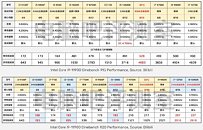- Joined
- Oct 9, 2007
- Messages
- 47,598 (7.45/day)
- Location
- Dublin, Ireland
| System Name | RBMK-1000 |
|---|---|
| Processor | AMD Ryzen 7 5700G |
| Motherboard | Gigabyte B550 AORUS Elite V2 |
| Cooling | DeepCool Gammax L240 V2 |
| Memory | 2x 16GB DDR4-3200 |
| Video Card(s) | Galax RTX 4070 Ti EX |
| Storage | Samsung 990 1TB |
| Display(s) | BenQ 1440p 60 Hz 27-inch |
| Case | Corsair Carbide 100R |
| Audio Device(s) | ASUS SupremeFX S1220A |
| Power Supply | Cooler Master MWE Gold 650W |
| Mouse | ASUS ROG Strix Impact |
| Keyboard | Gamdias Hermes E2 |
| Software | Windows 11 Pro |
Intel's 11th generation Core "Rocket Lake-S" desktop processors could feature similar Power Level values to their 10th Gen counterparts, according to a recent Core i9-11900 engineering sample benchmark leak posted to Chinese social media platform Bilibili. The i9-11900 (non-K) is a locked SKU that succeeds the i9-10900, and has a rated TDP of 65 W (which is also its PL1), but the PL2 value is reportedly 224 W, identical to that of the i9-10900. A recent report also predicted that individual 11th Gen SKUs have the same TDP (PL1) ratings as their 10th Gen counterparts, with locked SKUs rated at 65 W, and unlocked "K" and "KF" SKUs featuring 125 W.
The "QV1J" engineering sample for the i9-11900, which has been doing rounds with most leaks, has a nominal clock speed of just 1.80 GHz, an all-core Turbo Boost frequency of 3.80 GHz, and maximum (single-core) boost frequency of 4.40 GHz. The 8-core/16-thread processor ends up performing slightly better than the i9-9900K at Cinebench R15 and Cinebench R20, although not nearly enough to qualify as a generational performance uplift. The i9-11900 ES was tested on a motherboard based on the next-gen mid-range Intel B560 chipset.


View at TechPowerUp Main Site
The "QV1J" engineering sample for the i9-11900, which has been doing rounds with most leaks, has a nominal clock speed of just 1.80 GHz, an all-core Turbo Boost frequency of 3.80 GHz, and maximum (single-core) boost frequency of 4.40 GHz. The 8-core/16-thread processor ends up performing slightly better than the i9-9900K at Cinebench R15 and Cinebench R20, although not nearly enough to qualify as a generational performance uplift. The i9-11900 ES was tested on a motherboard based on the next-gen mid-range Intel B560 chipset.


View at TechPowerUp Main Site








